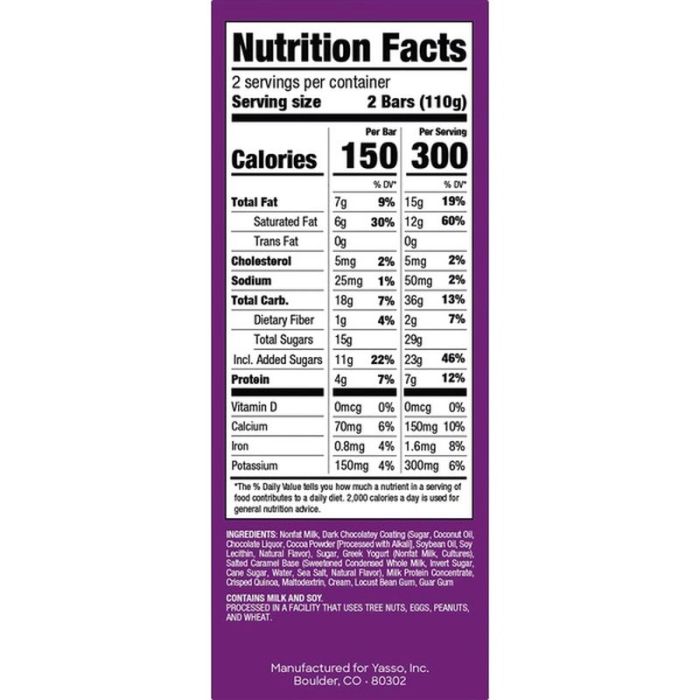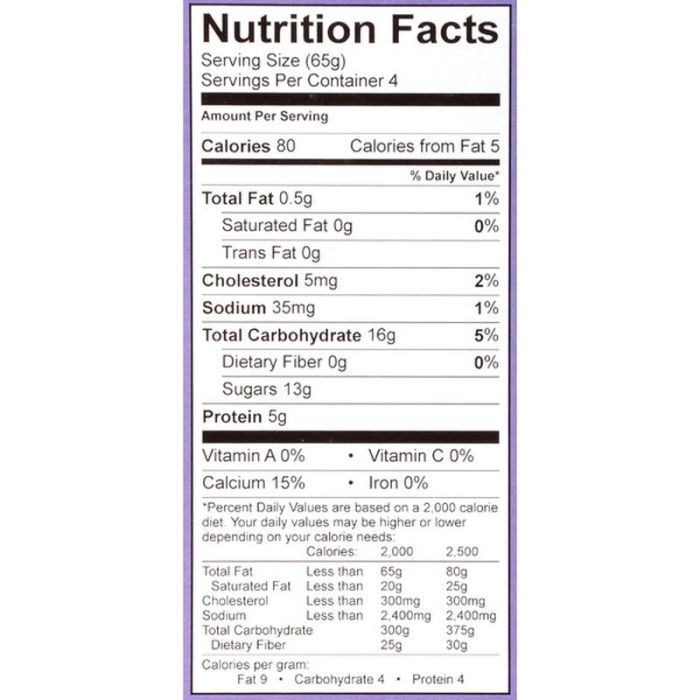Ingredient Analysis of Yasso Bars
Yasso bars nutrition facts – Yasso frozen Greek yogurt bars present a complex interplay of ingredients contributing to their overall nutritional profile and sensory experience. A detailed analysis of these components is crucial for understanding both the benefits and potential drawbacks of consuming these popular treats. This analysis will examine the primary ingredients, potential allergens, and sourcing considerations.
Primary Ingredients and Nutritional Implications
Yasso bars primarily consist of Greek yogurt, which provides a significant source of protein and calcium. The high protein content contributes to satiety, potentially aiding in weight management. However, the fat content, while largely composed of healthy fats from milk, should be considered within the context of an individual’s overall dietary intake. The addition of sweeteners, typically a blend of sugar and sugar alcohols like erythritol, impacts the overall carbohydrate and sugar content.
While sugar alcohols generally have a lower glycemic index than sugar, excessive consumption can lead to gastrointestinal discomfort in some individuals. Finally, the inclusion of fruits and chocolate contributes to the flavor profile but also introduces additional sugars and fats, varying depending on the specific flavor. The balance of these ingredients dictates the overall nutritional value, ranging from relatively low-calorie options to higher-calorie, more indulgent varieties.
Potential Allergens in Yasso Bars
It is essential to carefully review the ingredient list of each specific Yasso bar flavor, as allergen content may vary. However, based on common ingredients, potential allergens include:
- Milk: A primary ingredient in Greek yogurt.
- Soy: May be present in some flavors as a soy lecithin emulsifier.
- Tree nuts: Certain flavors may contain nuts or nut extracts.
- Peanuts: Depending on the manufacturing facility and shared equipment, cross-contamination is possible.
Consumers with allergies should always carefully check the ingredient label and seek clarification from the manufacturer if needed, paying close attention to any statements regarding potential cross-contamination.
Sourcing and Processing of Key Ingredients: Sustainability and Ethical Considerations
The sourcing and processing of key ingredients, particularly the Greek yogurt, significantly impact the sustainability and ethical profile of Yasso bars. While specific details about Yasso’s sourcing practices are not always readily available on their packaging, it is reasonable to assume that they utilize milk from dairy farms. The sustainability of dairy farming practices is a complex issue, encompassing considerations such as land use, water consumption, greenhouse gas emissions, and animal welfare.
Yo, checking out Yasso bars nutrition facts? They’re pretty sweet, but sometimes you crave something else, right? Maybe you’re thinking about grabbing a McD’s iced coffee – check out the nutrition facts mcdonalds iced coffee to see how it stacks up. Then, you can decide if those Yasso bars are still the better choice for your fitness goals, man!
Ethical sourcing would involve prioritizing farms that adhere to high standards of animal welfare and environmental responsibility. Furthermore, the processing of the yogurt itself requires energy and water, factors that should be considered within the broader context of the product’s environmental footprint. Transparency in sourcing and processing information would greatly enhance the consumer’s ability to make informed choices aligned with their values.
Yasso Bars Compared to Other Frozen Dessert Options

Yasso frozen Greek yogurt bars offer a potentially healthier alternative to traditional frozen desserts. A comparative analysis of their nutritional profile against ice cream, frozen yogurt from other brands, and other frozen novelty bars provides valuable insight into their position within the market and their overall health implications for consumers. This comparison focuses on key nutritional components to facilitate informed consumer choices.
The following table presents a comparison of Yasso bars with other popular frozen dessert options. Note that specific nutritional values can vary depending on flavor and serving size. The data presented represents average values obtained from readily available nutritional information from reputable sources.
Nutritional Comparison of Frozen Desserts
| Product Name | Calories per Serving | Fat per Serving (g) | Sugar per Serving (g) |
|---|---|---|---|
| Yasso Frozen Greek Yogurt Bar (average) | 100-140 | 3-6 | 10-15 |
| Average Ice Cream (1/2 cup) | 130-250 | 8-15 | 15-25 |
| Average Frozen Yogurt (1/2 cup) | 100-180 | 2-8 | 12-20 |
| Average Other Frozen Novelty Bar | 100-200 | 5-12 | 10-20 |
Health Implications of Frozen Dessert Choices
Based on the table above, Yasso bars generally exhibit a lower calorie, fat, and sometimes sugar content compared to many ice cream options. While some frozen yogurts may have a similar calorie and fat content, Yasso bars often contain less added sugar. Other frozen novelty bars show considerable variation, with some containing similar nutritional profiles to Yasso bars and others having significantly higher levels of fat and sugar.
The lower fat content in Yasso bars, stemming from the use of Greek yogurt, contributes to a potentially lower saturated fat intake, which is beneficial for cardiovascular health. However, the sugar content remains relatively high in many Yasso bar varieties, and consumers should remain mindful of their overall sugar intake.
Macronutrient Profile Comparison: Yasso Bar vs. Ice Cream
A visual representation comparing the macronutrient profiles (protein, carbohydrates, and fat) of a Yasso bar and a comparable serving of ice cream could utilize a stacked bar chart. The Yasso bar chart would display a larger segment representing protein due to the higher protein content of Greek yogurt. The carbohydrate segment would be substantial but potentially smaller than that of ice cream, depending on the specific flavor.
The fat segment would be notably smaller in the Yasso bar compared to the ice cream bar, reflecting the lower fat content. In contrast, the ice cream bar chart would showcase a smaller protein segment, a larger carbohydrate segment (due to higher sugar content), and a significantly larger fat segment.
Nutritional Considerations for Different Diets

Yasso frozen yogurt bars present a unique nutritional profile that warrants consideration within the context of various dietary approaches. Their composition, characterized by relatively low fat and sugar content compared to many ice cream alternatives, makes them potentially suitable for inclusion in several dietary plans, although careful consideration of individual bar flavors and serving sizes remains crucial. This section examines the compatibility of Yasso bars with specific dietary needs and restrictions, highlighting both potential benefits and limitations.
Yasso Bars and Low-Carbohydrate Diets
Yasso bars, particularly those with lower fruit content, can be incorporated into a low-carbohydrate diet. The primary carbohydrate source in Yasso bars is the added sugars and the naturally occurring sugars in fruit (if present). Individuals following a low-carb diet should carefully review the nutrition label of their chosen Yasso bar flavor to assess the carbohydrate content and ensure it aligns with their daily intake goals.
For example, a bar with minimal added sugar and fruit will have a significantly lower carbohydrate count than one with a higher concentration of these ingredients. Choosing lower-sugar flavors and controlling portion size are key to managing carbohydrate intake when consuming Yasso bars on a low-carbohydrate diet.
Yasso Bars and Ketogenic Diets
The suitability of Yasso bars for ketogenic diets is highly dependent on the specific flavor and serving size. While some flavors may contain a sufficiently low net carbohydrate count to be compatible with ketogenic principles (typically under 20 grams of net carbs per day), others may exceed this limit. It is essential to carefully check the nutrition label and calculate the net carbohydrate content (total carbohydrates minus fiber minus sugar alcohols) before incorporating Yasso bars into a ketogenic diet.
Many flavors may be too high in sugar to be suitable for strict keto adherence. Prioritizing flavors with minimal added sugars and fruit is crucial for those on a ketogenic diet.
Yasso Bars and Vegan Diets
Standard Yasso bars are not suitable for vegan diets as they contain milk and whey protein. However, Yasso does offer a vegan line of bars. These vegan options are made with plant-based ingredients, and their nutritional profile will differ from the standard bars. Individuals following a vegan diet should ensure they select the specifically labeled vegan Yasso bars to maintain dietary adherence.
Checking the ingredient list for any animal-derived components is paramount before consumption.
Incorporating Yasso Bars into Balanced Diets, Yasso bars nutrition facts
Yasso bars can be incorporated into a balanced diet as a occasional treat or part of a dessert plan, rather than a primary source of nutrition. For individuals focusing on overall health and wellness, mindful consumption is key. For example, a single Yasso bar could be included as a dessert portion within a meal plan that emphasizes whole grains, fruits, vegetables, and lean protein sources.
Considering the nutritional profile, Yasso bars could replace a higher-calorie, higher-sugar dessert option, thus potentially contributing to a more balanced overall caloric intake.
Potential Health Benefits and Drawbacks of Regular Consumption
While Yasso bars offer a lower-fat and lower-sugar alternative to many frozen desserts, regular consumption should still be approached with moderation. Potential benefits include a slightly reduced calorie intake compared to richer desserts. However, regular consumption could still contribute to excess sugar intake if not carefully monitored, potentially impacting blood sugar levels and overall health. Furthermore, reliance on processed frozen desserts, even healthier options like Yasso bars, should not replace whole foods and nutrient-dense options in a balanced diet.
Excessive consumption might lead to nutritional imbalances if it displaces more nutrient-rich food choices.
FAQ Section: Yasso Bars Nutrition Facts
Are Yasso bars gluten-free?
Most Yasso bar flavors are gluten-free, but always check the specific ingredient list for each flavor to be sure, as manufacturing processes can change.
How much protein is in a Yasso bar?
The protein content varies slightly depending on the flavor, but generally ranges from 4-6 grams per bar.
Are Yasso bars suitable for a ketogenic diet?
Due to their sugar content, Yasso bars are generally not considered suitable for strict ketogenic diets. However, some individuals may incorporate them sparingly.
What are the best Yasso bar flavors for someone watching their sugar intake?
Look for flavors with fewer added sugars. Checking the nutrition facts label is essential to compare sugar content across different flavors.
